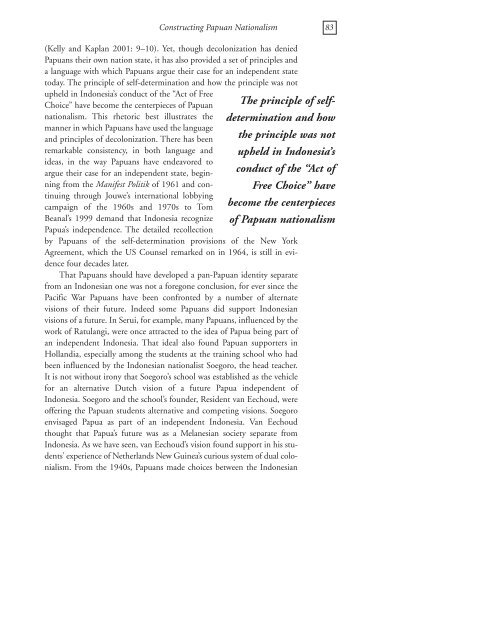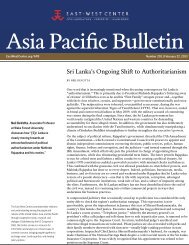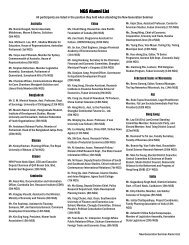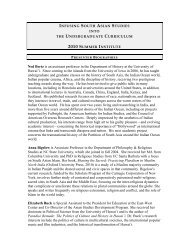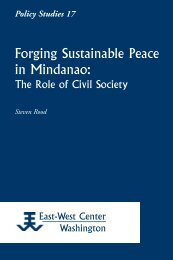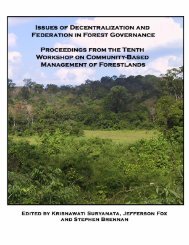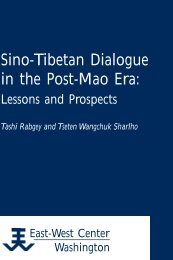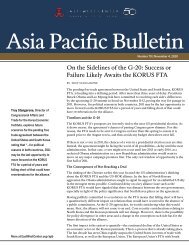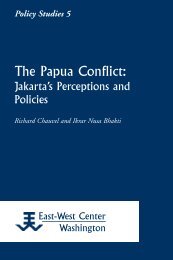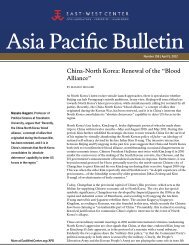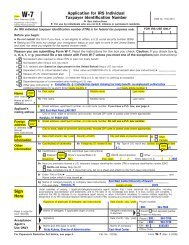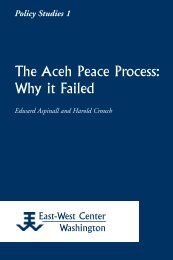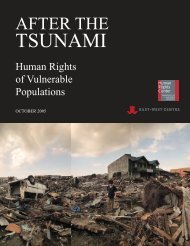Constructing Papuan Nationalism: History, Ethnicity ... - ScholarSpace
Constructing Papuan Nationalism: History, Ethnicity ... - ScholarSpace
Constructing Papuan Nationalism: History, Ethnicity ... - ScholarSpace
- No tags were found...
You also want an ePaper? Increase the reach of your titles
YUMPU automatically turns print PDFs into web optimized ePapers that Google loves.
<strong>Constructing</strong> <strong>Papuan</strong> <strong>Nationalism</strong> 83(Kelly and Kaplan 2001: 9–10). Yet, though decolonization has denied<strong>Papuan</strong>s their own nation state, it has also provided a set of principles anda language with which <strong>Papuan</strong>s argue their case for an independent statetoday. The principle of self-determination and how the principle was notupheld in Indonesia’s conduct of the “Act of FreeChoice” have become the centerpieces of <strong>Papuan</strong>nationalism. This rhetoric best illustrates themanner in which <strong>Papuan</strong>s have used the languageand principles of decolonization. There has beenremarkable consistency, in both language andideas, in the way <strong>Papuan</strong>s have endeavored toargue their case for an independent state, beginningfrom the Manifest Politik of 1961 and continuingthrough Jouwe’s international lobbyingcampaign of the 1960s and 1970s to TomBeanal’s 1999 demand that Indonesia recognizePapua’s independence. The detailed recollectionby <strong>Papuan</strong>s of the self-determination provisions of the New YorkAgreement, which the US Counsel remarked on in 1964, is still in evidencefour decades later.That <strong>Papuan</strong>s should have developed a pan-<strong>Papuan</strong> identity separatefrom an Indonesian one was not a foregone conclusion, for ever since thePacific War <strong>Papuan</strong>s have been confronted by a number of alternatevisions of their future. Indeed some <strong>Papuan</strong>s did support Indonesianvisions of a future. In Serui, for example, many <strong>Papuan</strong>s, influenced by thework of Ratulangi, were once attracted to the idea of Papua being part ofan independent Indonesia. That ideal also found <strong>Papuan</strong> supporters inHollandia, especially among the students at the training school who hadbeen influenced by the Indonesian nationalist Soegoro, the head teacher.It is not without irony that Soegoro’s school was established as the vehiclefor an alternative Dutch vision of a future Papua independent ofIndonesia. Soegoro and the school’s founder, Resident van Eechoud, wereoffering the <strong>Papuan</strong> students alternative and competing visions. Soegoroenvisaged Papua as part of an independent Indonesia. Van Eechoudthought that Papua’s future was as a Melanesian society separate fromIndonesia. As we have seen, van Eechoud’s vision found support in his students’experience of Netherlands New Guinea’s curious system of dual colonialism.From the 1940s, <strong>Papuan</strong>s made choices between the IndonesianThe principle of selfdeterminationand howthe principle was notupheld in Indonesia’sconduct of the “Act ofFree Choice” havebecome the centerpiecesof <strong>Papuan</strong> nationalism


